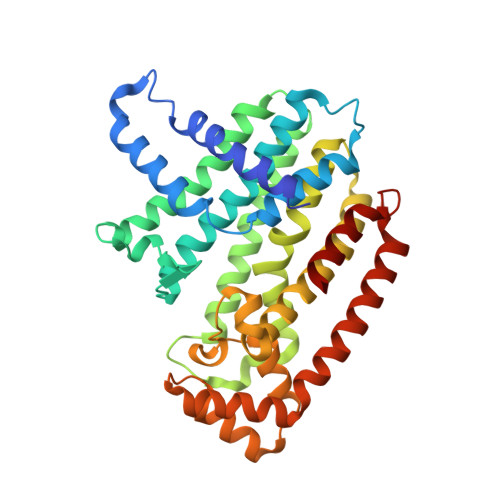Allosteric non-bisphosphonate FPPS inhibitors identified by fragment-based discovery.
Jahnke, W., Rondeau, J.M., Cotesta, S., Marzinzik, A., Pelle, X., Geiser, M., Strauss, A., Gotte, M., Bitsch, F., Hemmig, R., Henry, C., Lehmann, S., Glickman, J.F., Roddy, T.P., Stout, S.J., Green, J.R.(2010) Nat Chem Biol 6: 660-666
- PubMed: 20711197
- DOI: https://doi.org/10.1038/nchembio.421
- Primary Citation of Related Structures:
3N1V, 3N1W, 3N3L, 3N45, 3N46, 3N49, 3N5H, 3N5J, 3N6K - PubMed Abstract:
Bisphosphonates are potent inhibitors of farnesyl pyrophosphate synthase (FPPS) and are highly efficacious in the treatment of bone diseases such as osteoporosis, Paget's disease and tumor-induced osteolysis. In addition, the potential for direct antitumor effects has been postulated on the basis of in vitro and in vivo studies and has recently been demonstrated clinically in early breast cancer patients treated with the potent bisphosphonate zoledronic acid. However, the high affinity of bisphosphonates for bone mineral seems suboptimal for the direct treatment of soft-tissue tumors. Here we report the discovery of the first potent non-bisphosphonate FPPS inhibitors. These new inhibitors bind to a previously unknown allosteric site on FPPS, which was identified by fragment-based approaches using NMR and X-ray crystallography. This allosteric and druggable pocket allows the development of a new generation of FPPS inhibitors that are optimized for direct antitumor effects in soft tissue.
Organizational Affiliation:
Center for Proteomic Chemistry and Global Discovery Chemistry, Novartis Institutes for Biomedical Research, Basel, Switzerland. wolfgang.jahnke@novartis.com
















